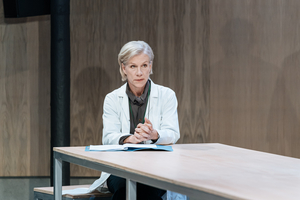 Reviewed by Barry Lenny, Friday 28th February 2020.
Reviewed by Barry Lenny, Friday 28th February 2020.
Loosely adapted by
Robert Icke, from
Arthur Schnitzler's 1912 play, Professor Bernhardi,
The Doctor is a powerful drama. Icke has also directed this play, which has had large audiences and achieved critical acclaim in England.
Hildegard Bechtler's clean and simple clinical design is lit effectively by
Natasha Chivers, and
Tom Gibbons's sound and composition adds much to the ever-changing mood.
Right at the beginning of the play, Dr. Ruth Wolff corrects somebody's grammar. There was a character to whom I could instantly relate. She is treating a fourteen-year-old girl suffering terminal sepsis, with little time left to live, following a disastrous attempt to self-abort an unwanted pregnancy. A thoroughly obnoxious Catholic priest arrives and demands to see the girl, but is stopped by Ruth who does not want the girl upset by learning that she is dying, wishing for her to die peacefully. He argues that he was sent by the parents, who are in his congregation, but Ruth argues that the girl has not asked to see a priest. He reluctantly admits that the girl does not even attend church. He then tries to force his way into the patient's room, but Ruth physically stops him, until after the girl is pronounced dead. That small action of pushing him back sets off an ever-escalating chain of events.
As the treating physician, Ruth had a legal and ethical duty of care. The priest did not, and, as he was not even a member of the family, he had no rights or authority to insist on seeing the patient. Through a combination of her medical condition and the effects of palliative care, the young woman was unaware of the gravity of her condition and had no knowledge of her impending death. Ruth, quite sensibly, wanted to keep it that way and allow her a quiet death.
Juliet Stevenson, as
Ruth Wolff, is central to everything, onstage for almost the entire performance, even staying seated at a table throughout the interval. The rest of the cast circle her, some of the other characters being with her, and some against her, particularly the second in command, Hardiman, played by Naomi Wirthner, a Catholic who wants the top job, and more Catholics in senior positions. Hardiman goes as far as allowing the girl's extremely angry father into the meeting room, where he vents his fury at Ruth, refuses to listen to what she has to say, and eventually punches her. The internal politics is only the start. The affair extends to the government, and a grant for a new building is also threatened.
Ruth is a secular Jew, and not the only Jew in the group, so we have religious divisions, with the priest's role particularly relevant in Australia where our Pentecostal Prime Minister is pushing for a Religious Freedoms bill to be passed, a bill that is, in fact, really about Christian privilege. There would have been, no doubt, considerable discussion about that following the performance.
It does not stop there, though. Word spreads, and social media gets involved, starting slowly, then expanding exponentially. A few people condemning Ruth grows into many thousands of the usual ignorant, ill-informed, and anonymous trolls, but there is even more. Racism also rears its ugly head. Here, things get a little confusing, because a white actor reveals that his character is a black priest.
It was never just an inquiry; it was a witch-hunt from the very start. Every person attacking Ruth seems to have his or her own agenda, their own questions, their own complaints, and their own weapons. There are so many levels and so many factors at play, ruthlessly buffeting Ruth in all directions.
Confusion grows as members of the cast not only play other ethnicities, but also other sexes. Ruth's partner, Charlie, is played by a woman, but is she playing a man, or is Ruth a lesbian? We are left wondering.
The play, for me, and, it seems, for others, gradually became confused, and confusing, as if the complexities of the play itself were not enough to demand intense attention. It is progressively harder for Ruth as time passes, and no easy ride for the audience, either.
Juliet Stevenson, in the titular role, gives a stellar performance as she traces Ruth's decline and fall. She begins as a strong, confidant, controlling, inflexible, and occasionally bombastic person. As the play progresses we see dramatic changes that Stevenson conveys in every fibre of Ruth's being. Her performance is a masterpiece.
As her principal antagonist, Hardiman
, Naomi Wirthner leaves no doubt that her character is strongly opposed to Ruth and wants to be the one in control. She gives an incredibly strong performance, with plenty of anger that suggests long-held resentment.
The whole cast presents superb characterisations, each well thought out and fully realised and, as an ensemble, their interactions are wonderful. An interesting idea, too, is to have drummer, Hannah Ledwidge, perched above the stage, providing a percussive soundtrack throughout as a sort of Greek chorus.
Be quick to catch this production.
Reader Reviews
To post a comment, you must
register and
login.
 Reviewed by Barry Lenny, Friday 28th February 2020.
Reviewed by Barry Lenny, Friday 28th February 2020. Reviewed by Barry Lenny, Friday 28th February 2020.
Reviewed by Barry Lenny, Friday 28th February 2020.